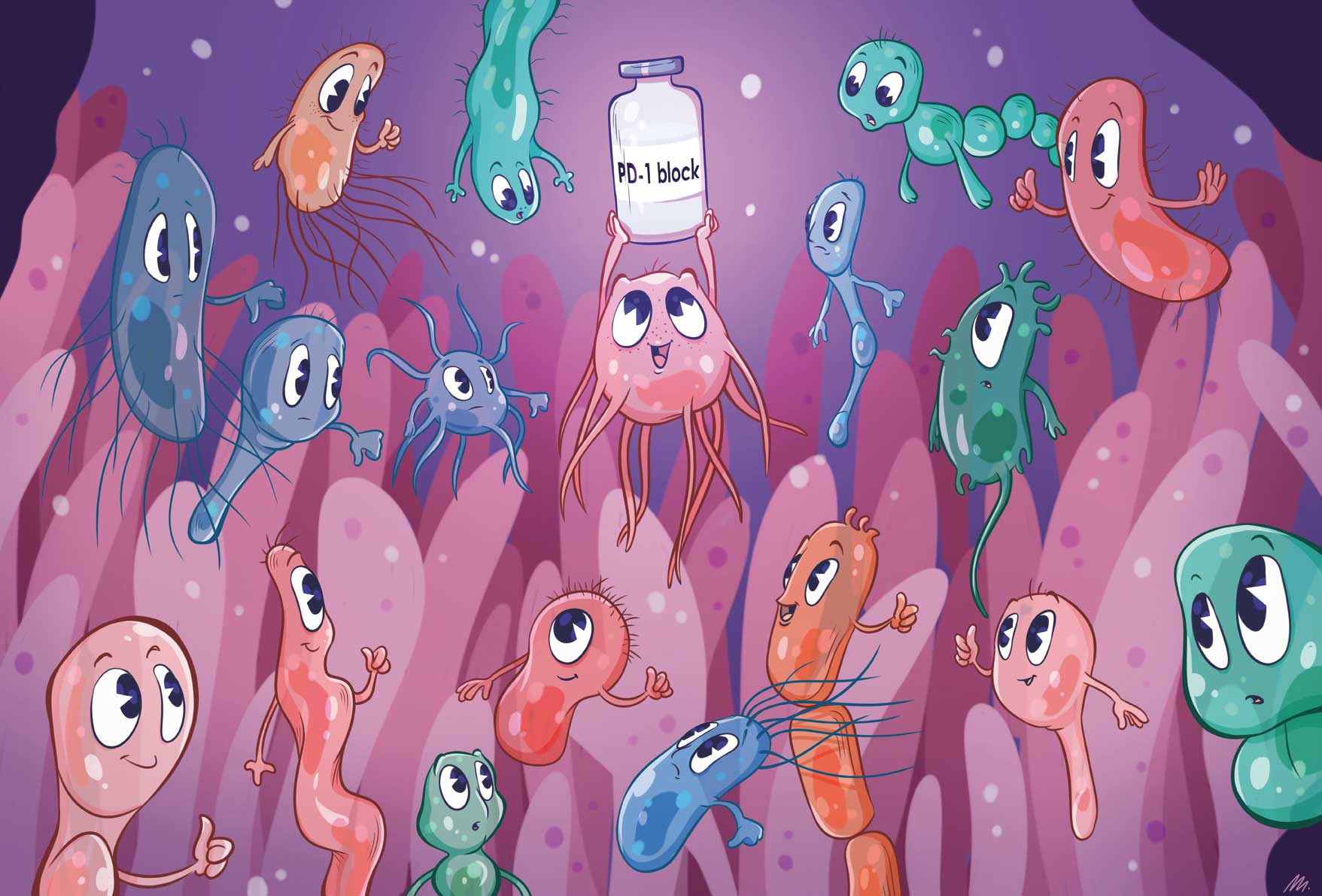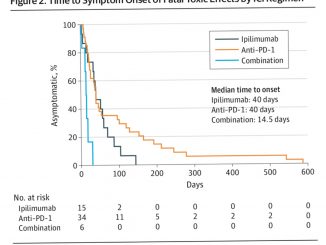A spate of recent studies suggest that differences in population of bacteria and other micro-organisms that inhabit our intestines may be a key factor differentiating between people who respond to immune checkpoint inhibitors and those who do not. Sophie Fessl looks at the evidence and asks what it could mean for patients.
Accepting a course of anti-biotics to clear a lung infection that has landed you in hospital might seem a no-brainer. But for the husband of patient advocate Gilliosa Spurrier-Bernard, who is trying to optimise his chances of surviving stage IV melanoma, the doctor’s advice posed a serious dilemma.
The two of them had been following the growing literature showing a link between the state of the bacteria and other micro-organisms in the gut and response to immunotherapy, and they didn’t want to compromise his chances.
“So when doctors wanted to give him antibiotics, we asked: Are these antibiotics really necessary? Will they affect the checkpoint inhibitor therapy?” says Gilliosa Spurrier-Bernard, who is also founder and president of the patient advocacy group Mélanome France.
“Patients are concerned that antibiotics will harm their response to checkpoint inhibitor therapy. It is their last line of therapy, and they do not want to risk their chances of a good response in an environment short on evidence,” she says.
Only a minority of patients respond to immune checkpoint inhibitors, and some of these patients will stop responding eventually. Three studies published at the beginning of the year suggest that gut bacteria shape treatment response in patients treated with anti-PD-1 therapy for melanoma, non-small-cell lung cancer or renal cell carcinoma – an effect that can be replicated in mice. This may explain why not all patients respond to immune checkpoint inhibitors, and may eventually open new options to increase response rate.
The bacteria, and other micro-organisms such as archaea, fungi or protozoa, living on the internal and external surfaces of our bodies form the so-called human microbiota. Around 3×10^13 bacterial cells reside in the gut alone, mostly as commensals (neither hurting nor helping the host). Some bacteria are beneficial to their host and interact with intestinal cells to prevent infestation by pathogens, synthesise vitamins, and much more – including influencing metabolic functions, inflammation, and adaptive immunity. Which bacteria and micro-organisms make up our individual microbiota is shaped by many factors, including genetics, lifestyle, birth delivery… and exposure to antibiotics.
There is a growing body of evidence to show that a dysregulation of the interaction between microbiota and host is associated with a range of diseases, from inflammatory bowel disease to diabetes and liver cirrhosis. Preclinical data from the past five years suggest that cancer will probably be added to this list, says Giorgio Trinchieri, Director of the Cancer and Inflammation Program at the US National Institutes of Health. “For the past few years, we have known from mouse models that the gut microbiota affects chemotherapy and immunotherapy. And there has been a lot of interest in these results – in the past three years, every major academic cancer conference had a session on microbiota and cancer.”
First clinical data
A trio of studies published in Science (5 January 2018), looking at cancer patients treated with anti-PD-1 immunotherapy, suggest that patients can be divided into responders and non-responders based on the composition of their gut microbiota. Trinchieri, who was not involved in the studies, says they represent major progress in the field, “as they start putting in clinical data.”
Composition of the gut microbiota differs between patients who go on to respond to anti- PD-1 therapy and those who do not
Two of the studies, by Jennifer Wargo at MD Anderson Cancer Center, Houston, Texas, and Thomas Gajewski at University of Chicago, Illinois, analysed the faecal microbiota from more than 40 patients with melanoma before treatment with anti-PD-1 therapy. The group led by Laurence Zitvogel at the Institut Gustave Roussy, Villejuif, Paris, analysed the faecal microbiota of 153 patients with non-small-cell lung cancer or renal cell carcinoma. All groups found that the composition of the gut microbiota before the start of treatment differs between patients who go on to respond to anti-PD-1 therapy and those who do not. In addition, faecal microbial analysis in all three studies identified bacteria that positively correlate with clinical outcome.
Zitvogel’s group found more bacteria from the species Akkermansia muciniphila in the gut microbiota of patients responding to anti-PD-1 therapy, defined by either the best response according to Recist 1.1 criteria or progression-free survival for three months.
Gajewski’s group identified eight bacterial species that predict favourable response in patients with melanoma (analysed by Recist 1.1 criteria), among them Bifidobacterium longum. In previous work, the group had shown that the presence of Bifidobacterium in the intestine of mice was associated with improved immune-mediated tumour control.
The group led by Jennifer Wargo found that patients with melanoma who responded to anti-PD-1 therapy (Recist1.1 response or stable disease at 6 months) had a high relative abundance of Clostridiales, Ruminococcaceae, and Faecalibacterium, while non-responding patients had a high relative abundance of bacteria of the order Bacteroidales.
To test whether the microbiota of responding patients contains bacteria that drive anti-PD-1 response, all three groups transferred patients’ faecal microbiota into germ-free mice. All studies found that these mice reproduced the phenotypes of responder and non-responder patients. When the mice were injected with cancer cells and anti-PD-1 immunotherapy, those that had received faecal transplants from responding patients showed better responses than the mice that had received faecal transplants from non-responders.
Mice with faecal transplants from responding patients responded better than those with transplants from non-responders
Laurence Zitvogel and her group also looked at a large cohort of patients with advanced lung, renal or urothelial cancer treated with anti-PD-1. They found that patients who had received antibiotics within two months before or one month after beginning anti-PD-1 therapy relapsed sooner. The overall survival of these patients was less than half as long as that in patients who had not received antibiotics.
Opportunities and limitations
“Oncologists and physicians are aware of these studies, and somewhat shocked and surprised by these results,” says Bertrand Routy, lead author of the Zitvogel study. “But the results were validated by three independent groups. Even the most reluctant person faces the fact that the gut microbiota is key.”
Trinchieri cautions, however, that the two melanoma studies used small cohorts for the more detailed analysis of bacterial species, which was done using shotgun metagenomic sequencing. Also these studies used different techniques for identifying bacterial species and different assessment methods to classify patients into responders and non-responders, making a direct comparison between the two studies difficult.
His caution is broadly echoed by Audrey Humphries, clinical research coordinator at the Department of Melanoma and Cutaneous Oncology at UCSF (University of California, San Francisco), who compared recent studies on the gut microbiota and immune checkpoint inhibitors in a review article published online in April 2018 (Hum Vaccin Immunother 2018, 1-5).
“The weakness lies in the detail,” argues Humphries. “Although several studies reveal a clear relationship between the composition of the gut microbiota and a patient’s response to immunotherapy,” she says, “there is not yet a standardised way to measure the correlation between gut microbiota and responses – so from how the experiment is set up to how the data is analysed varies among studies.”
“This is a new and developing field,” adds melanoma advocate Spurrier-Bernard. “The science is getting better and the links between gut microbiota and immune response are becoming more apparent. But these are correlations; studies have not established a causality yet.”
What mechanism is at work?
While these studies demonstrate the importance of the gut microbiota in modulating patient response to immunotherapy, they also raise many important questions – most obviously the question of mechanism, which remains wide open.
As Trinchieri points out, the tumours studied are all located outside the colon, which means that the microbiota is not in direct contact with the tumour, “so it has to be an effect of distance.” Patients probably respond to immunotherapy because their microbiota gives them a pre-existing immune response that is amplified by anti-PD-1 therapy, reasons Trinchieri. “The microbiota most likely primes cells in the patients for an effective immune response.”
 In all three studies, the tumours of mice who had received a faecal microbiota transplant from responding patients had a higher density of antitumour CD8+ T cells, while tumours of mice who had received a faecal microbiota transplant from non-responding patients had a high density of immunosuppressive CD4+ Treg cells. According to Routy, of the Zitvogel group, preliminary data points to an involvement of T-cell trafficking and dendritic cells. In their paper, Wargo and colleagues also argue for a model in which patients who respond to checkpoint inhibitors “have enhanced systemic and anti-tumour immune responses mediated by increased antigen presentation, and improved effector T cell function in the periphery and the tumour microenvironment.”
In all three studies, the tumours of mice who had received a faecal microbiota transplant from responding patients had a higher density of antitumour CD8+ T cells, while tumours of mice who had received a faecal microbiota transplant from non-responding patients had a high density of immunosuppressive CD4+ Treg cells. According to Routy, of the Zitvogel group, preliminary data points to an involvement of T-cell trafficking and dendritic cells. In their paper, Wargo and colleagues also argue for a model in which patients who respond to checkpoint inhibitors “have enhanced systemic and anti-tumour immune responses mediated by increased antigen presentation, and improved effector T cell function in the periphery and the tumour microenvironment.”
But again, the mechanism behind this model is unknown, as Humphries points out. “It is unclear what cells or molecules are involved with how the microbiota communicate and influence the immune system. Though current research suggests that dendritic cells take part in the process.”
A case of ‘good’ vs ‘bad’ bacteria?
The second open question is about which bacteria are most important for promoting response to anti-PD-1 therapy. All three studies showed that the gut composition differs between non-responders and responders. The researchers also identified types of bacteria suggested to be beneficial for a response to anti-PD-1 therapy. However, each study identified different ‘favourable’ bacteria. Why the difference?
Favourable bacteria could differ according to the type of cancer involved, or patient population, suggests Trinchieri: “The microbiota are influenced by external variables, with large geographical differences. Food, for example, influences the microbiota. So while the microbiota affects anti-PD-1 therapy, which bacteria are actually involved could differ in different places. Also, which bacteria are important could differ according to patients and tumour.”
One theory suggests that it is the diversity of the gut microbiota that is important
In a recent review article, Marie Vetizou and Giorgio Trinchieri argue that “the discrepancy may in part be attributed to the small patient cohorts in geographically distant populations and different criteria for therapy response utilized in these studies,” (Cell Res 2018, 28:263–4).
It is not even certain that a favourable response can be tied to a single bacterium, or even a specific combination of species. One theory suggests that it is the diversity of the gut microbiota that is important. “This is a huge question, and based on the current research, we suspect that the mechanism could be multifactorial,” says Humphries.
“It is possible that a balance of high species diversity and an over-representation of a favourable population or species of bacteria is beneficial,” though, as she points out, this is hard to measure: “How do you ‘count’ if, in a diverse gut, there are some bacteria that are adverse?”
Vetizou and Trinchieri agree that the effects of the microbiota on therapy are unlikely to be due to single species, “but rather to changes in the ecology and metabolism of the gut microbiota that together affect cancer immunity. The identified species or group of species are likely biomarkers of these more complex ecological changes.”
Implications for treatment and outcomes
Then comes the question of whether this new knowledge has clinical relevance. Can gut microbiota act as a biomarker to predict who will respond to therapy and eventually help select the right therapeutic option? Can the microbiota be manipulated to increase the number of patients who respond to immune checkpoint therapy? “To try to predict or induce a response, we need more data,” Trinchieri cautions. Routy agrees: “Of course, the ultimate goal is to arrive at an intervention, but we are not there yet. We still have a few steps to validate before we can start to manipulate the gut microbiota of cancer patients: Which bacteria should we give to our patients? How, how often, and in which form?” Only clinical trials can provide definitive answers, and Routy, who now heads the Laboratory of Immunotherapy / Oncomicrobiome, at the University of Montréal, Canada, says he hopes to start enrolling patients in clinical trials in the next year or two. “We need to validate the importance of the gut microbiota in a larger international cohort, and develop novel biomarkers in the microbiome. But eventually, when a patient is newly diagnosed, along with a biopsy of the cancer, the microbiome will also be addressed.”
Other laboratories are also planning to transfer their results from bench to bedside. Wargo’s lab at the University of Texas MD Anderson Cancer Center collaborates with the Parker Institute for Cancer Immunotherapy to test the impact of anti-PD-1 therapy with microbiota therapy on the outcomes of patients with advanced metastatic melanoma. Gajewski and his lab are working with Evelo Biosciences to test whether giving Bifidobacterium with immunotherapy can increase the number of patients responding to checkpoint inhibitors. Trinchieri is collaborating closely with Hassane Zarour at the University of Pittsburgh, who is carrying out a clinical trial testing whether faecal microbiota transplant improves response to pembrolizumab in patients with PD-1 -resistant melanoma.
Intestinal microbiota influence efficacy of PD-1 blockade
The enrichment of specific microbial populations in intestines correlates with response to PD-1 blockade in cancer patients. Faecal microbiota transplants from responders into tumour-bearing mice improved responses to anti-PD-1 therapy and correlated with increased antitumour CD8+ cells in the tumours. Mice receiving faecal microbiota transplants from non-responders did not respond to anti-PD-1 therapy, and tumours had a high density of immune suppressive CD4+Treg cells.
Source: C Jobin (2018) Precision medicine using microbiota. Science 359: 32–34. © 2018, American Association for the Advancement of Science
Implications for antibiotic use?
Although trials are only just starting, the impact of studies suggesting that gut microbiota is closely linked with response to checkpoint therapy is already starting to be felt in the clinic. In their study, Routy and Zitvogel observed that antibiotic treatment negatively affected treatment response. Does this mean doctors should change their prescribing practice?
This is a question not just doctors but also patients are now having to grapple with, says melanoma patient advocate Spurrier-Bernard. “On our forums, concerned patients are saying that they worry about taking antibiotics, or sometimes propose not taking antibiotics, because their checkpoint inhibitor therapy might not be as effective anymore. This is a problem. We say that antibiotics have saved way more lives than any immunotherapy ever will. If an antibiotic is needed, patients should not be frightened to take it.”
Yet, as she points out, checkpoint inhibitors are often the last line of available therapy – and people with stage IV cancers are prepared to take risks. “So, this is about creating a good dialogue, about honesty: patients should ask whether prescribed antibiotics will affect their checkpoint inhibitor therapy, and clinicians should be prepared to have a reasonable discussion, even if it is ‘we don’t know yet for sure’.”
Routy echoes this concern: “Antibiotics save lives, and my biggest fear is that patients will not take antibiotics. As use of antibiotics affects the immune response, doctors should only prescribe antibiotics when they are really needed. This reinforces the importance of being thorough with antibiotic prescriptions.”
Patients are also willing to experiment, adds Spurrier-Bernard: “We know that patients are already managing their diet according to what is presumed to benefit their gut flora, and also self-treating with probiotics, for which there is no real evidence yet. And people are talking about faecal microbiota transplants, for which the evidence also just isn’t there yet – let alone a detailed knowledge of which compositions of gut flora are beneficial or not beneficial.” Patients’ biggest terror, she says, is failing to respond to, or acquiring resistance to, immunotherapy. “So they are asking what else they can do to prevent them from becoming someone who fails the treatment or gets acquired resistance. But although there is likely some amazing link between our immune system and signalling from gut bacteria, we just don’t know yet what it is. At the moment, patients probably can’t yet do more to help their immunotherapy response than what doctors have always advised: eat a healthy, balanced diet and continue to exercise.”
Her husband is still responding to immune checkpoint inhibitors, despite having taken his prescribed course of antibiotics. “Of course, we don’t want any more people dying, but we also don’t want patients to do something that harms them, like trying to survive without drugs that are essential to manage their side effects and infections,” says Spurrier-Bernard. “We want everyone to respond to immunotherapy, but we need much more evidence before we can say whether we can influence this by avoiding or adding other strategies.”





